December 2022 Archives
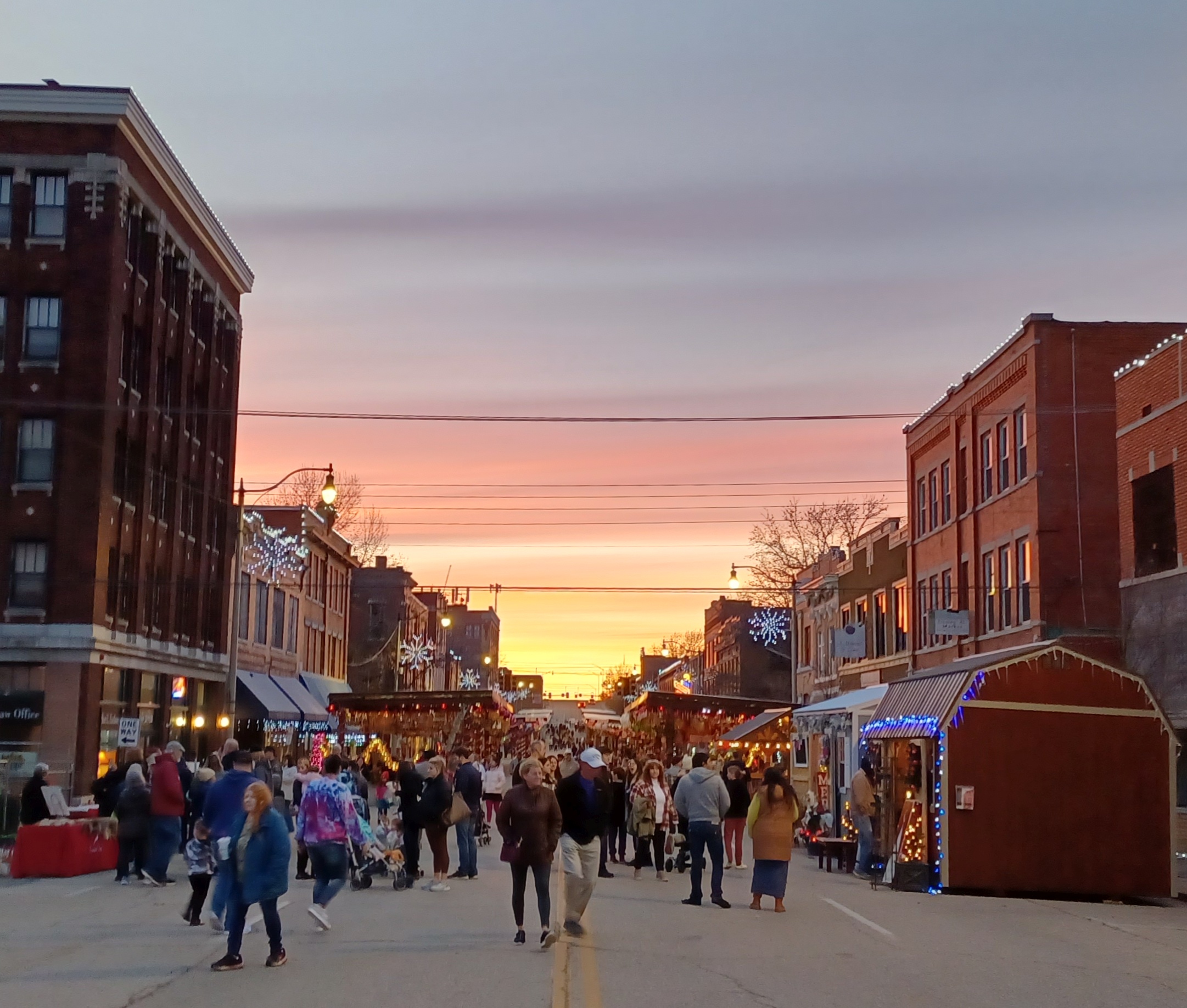
The Route 66 Christmas Chute on Dewey Avenue in downtown Sapulpa, Oklahoma, has just two more nights to run, but it continues to be a popular attraction two months after its opening on November 3, 2022. Ten overhanging steel structures decorated with a variety of themes stand in the street where the parking would normally be, and the shops on Dewey and side streets are open for business into the evenings. Admission is free. A Sapulpa Herald article about a preview in September provides a good description of the event. The Christmas Chute's Facebook page is frequently updated.
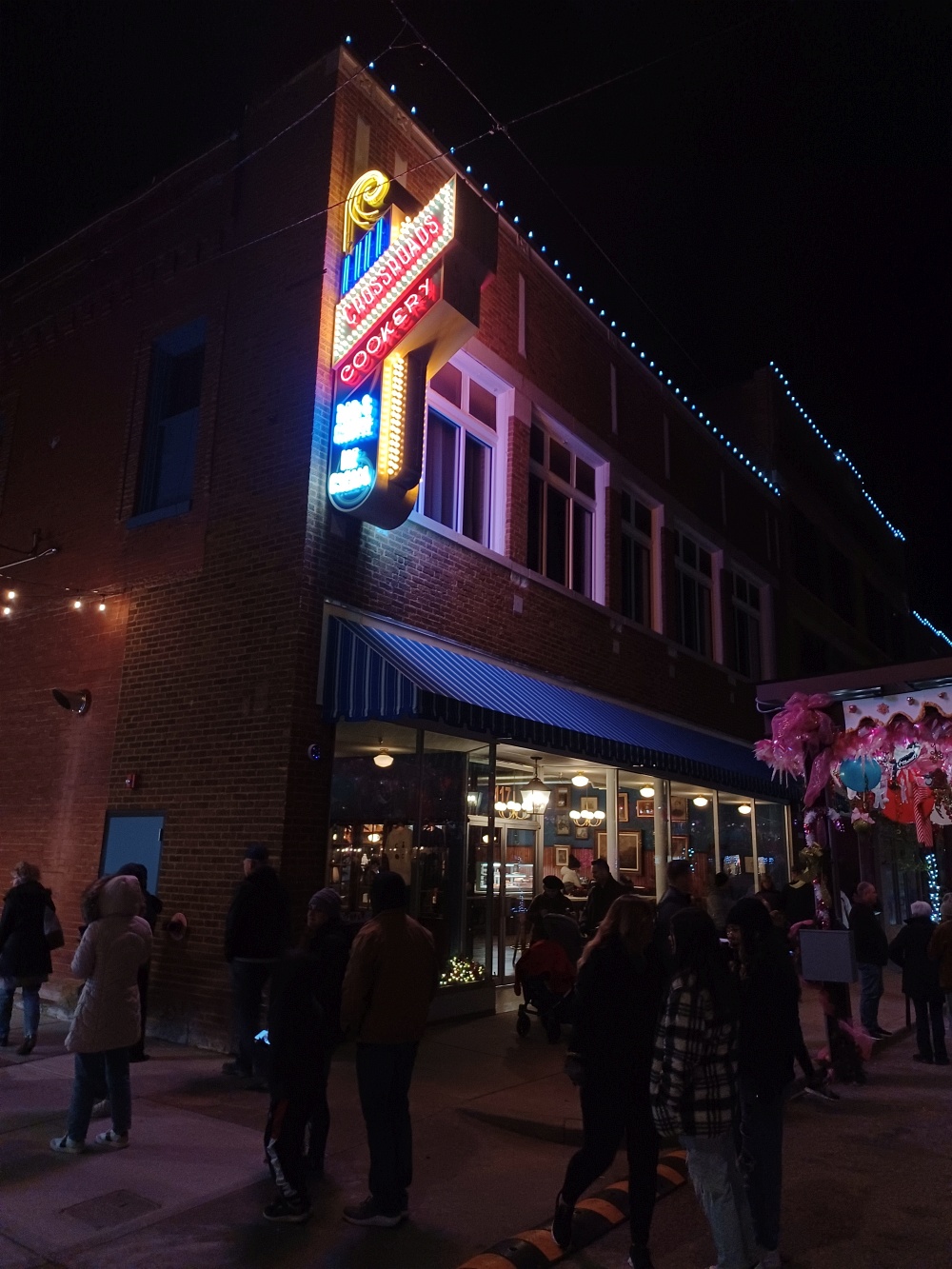
My wife and I visited back on November 12. We stopped in at Gigi's Gourmet Popcorn and bought some praline pecans to share, had dinner at the brand new Crossroads Cookery, walked through one of the downtown antique malls, and got a coffee at CTX Coffee. It was fun to look at the decorations and cheery to see so many people out and enjoying themselves.
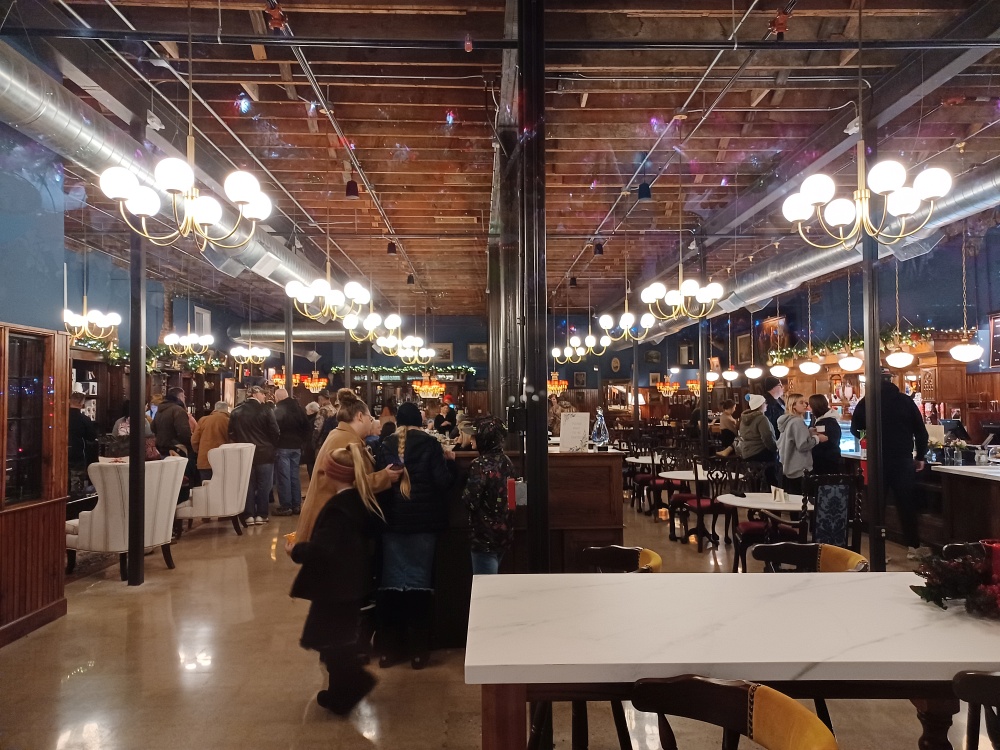
Crossroads Cookery was dealing with a few startup hiccups, but we enjoyed our meal, especially the crispy brussels sprouts. It's four things in one big space, decorated after the fashion of an early 1900s soda fountain -- a sit-down restaurant, a coffeehouse that roasts its own beans, an ice cream parlor (with baked treats, too), and a bar (that has Cabin Boys Brewery's Bearded Theologian on tap).
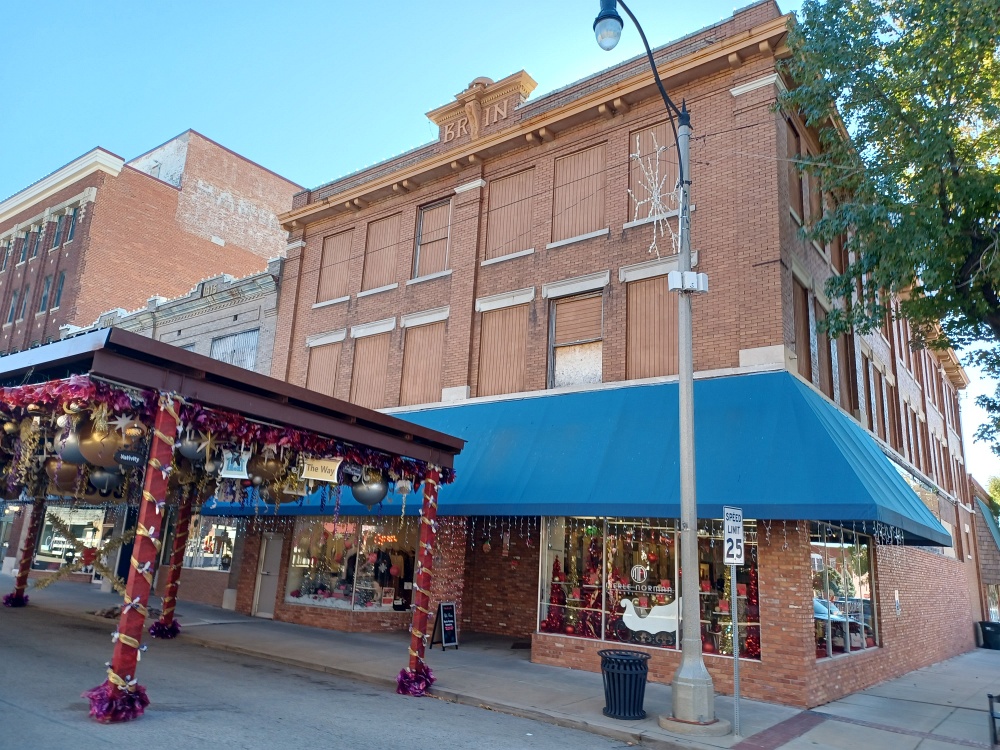
As we were walking back to the car, I happened to look up and notice the name "BRIN" on the cornice of the three-story building on the SE corner of Dewey and Park. I recognized this as the name of Tulsa bookseller Lewis Meyer's maternal grandparents. A peek through some old Sapulpa newspapers showed that the land was purchased from the city in 1909 by men's clothier Max Meyer (immortalized in Lewis Meyer's 1959 bestseller, Preposterous Papa) and his father-in-law and brother-in-law, Philip Brin and Ed Brin, respectively, of Terrill, Texas. The property had previously been occupied by a fire station and the city jail. The Brin Building opened in July 1910, and its first major tenant was Katz Department Store, based in Louisville, Ky. The building also housed a chiropractor and an ophthalmologist. Reading contemporaneous accounts of Max Meyer and seeing his display ads in old Sapulpa papers led me to the conclusion that nothing in Preposterous Papa was exaggerated. Max was simply larger than life.
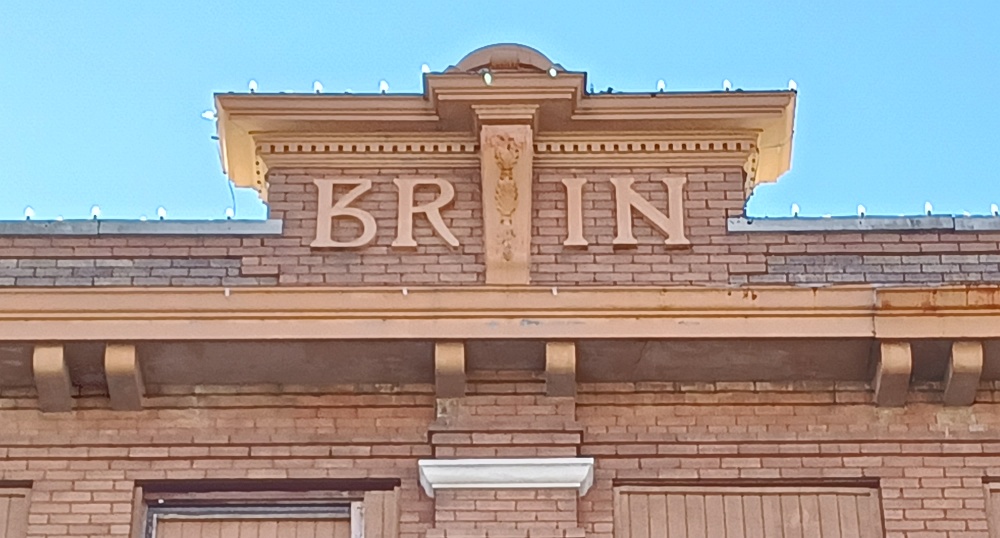
Last week, NBC's Today Show featured the Christmas Chute on the final installment of its "Merriest Main Street" series. Crowds showed up to be on live TV despite the single-digit temperatures, and CTX and Crossroads Cookery were open to provide food, drink, and warmth while the crowds were waiting for airtime.
Last night, December 30, I had to drop off my son at an event west of Tulsa and afterwards decided to pay a return visit to the Chute to see if it was still running. It was a warm evening, in the 50s, and there were a lot of people out on the street and visiting shops and restaurants. Crossroads Cookery was packed. Rose the Reindeer was in front of the courthouse; for $20 you can sit in a sleigh and get a picture with Rose.
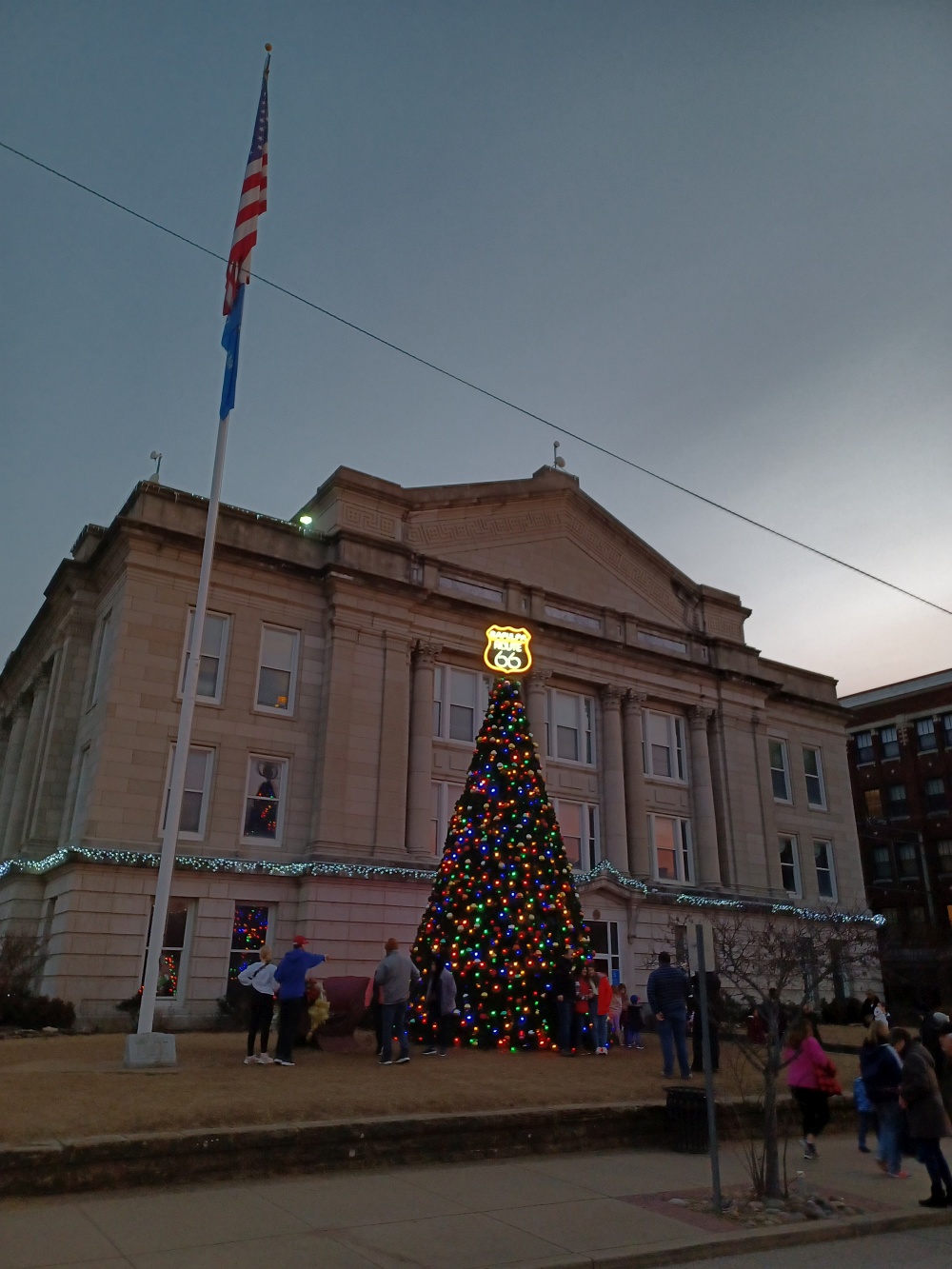
I walked the length of Dewey, and then a block south and back on Park and Water Streets. On Water Street, I came across a hot dog cart under a pop-up canopy in front of Chuck-It Axe Throwing Co. The food cart was launched as a way to draw attention to the axe throwing venue, but I was told that it has taken on a life of its own. I paid $7 for an excellent four-cheese grilled cheese sandwich, served in quarters with a little sauce cup of tomato bisque for dipping, perfect for eating and walking.
Dewey Avenue was closed to traffic on October 1 as the month-long construction process began. I am not sure how long it will take to dismantle the structures and reopen Dewey to traffic. It's not clear from the website or Facebook page when the final night is occurring, but there's a mention in the entry on Rose the Reindeer, suggesting that New Year's Day 2023 is the end of it: "Rose the reindeer will be at the Route 66 Christmas Chute from 5:00 - 8:00pm on Friday, Saturday, and Sunday! Feed and get photos with Rose for $20! What a great way to close down the first year of the Route 66 Christmas Chute--just as it began! See you there!"
This could be seen as an interesting experiment in pedestrianization. Pedestrianizing Main Street in downtown Tulsa in the 1970s killed the handful of retail businesses still there, although the Main Mall and Bartlett Square at 5th and Main provided a gathering place for the community, such as the First Night New Year's Eve celebrations in the early 1980s and Mayfest.
Sapulpa's businesses have received a lot of attention these past two months, and retailers were nervously optimistic after a big opening night. Business during the day, however, seemed to be pretty quiet when I stopped at CTX Coffee in mid-November for a coffee and a teleconference en route to Oklahoma City. My Table, a restaurant on the east end of the chute across the street from the courthouse and Christmas tree, "a location that has become notorious for short-lived eateries," closed permanently this past week, with staffing difficulties fueling unpredictable hours of operation. New restaurants have enough challenges that the street closure didn't necessarily hinder My Table's success, but it appears that they didn't have the personnel support to take full advantage of the crowds drawn to the Chute.
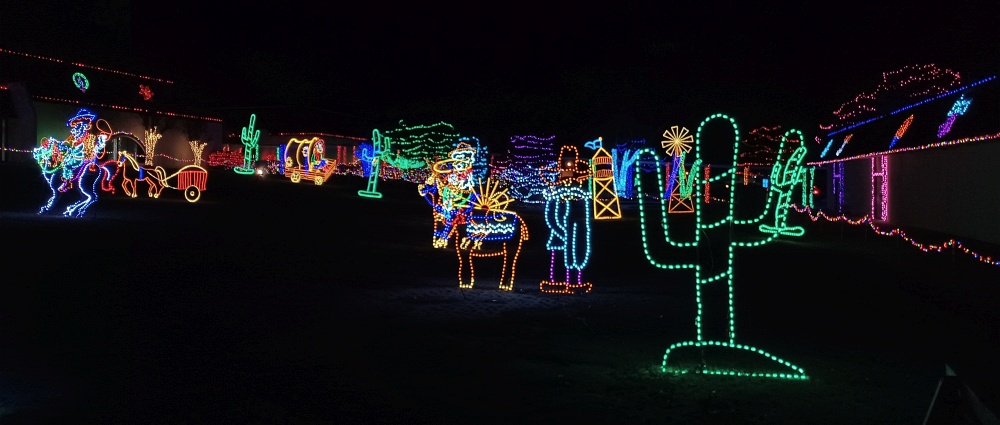
Meanwhile in Broken Arrow, Rhema Bible Training College's spectacular annual Christmas light display is also in its final two nights, with New Year's Day 2023 as the last night. We stopped by Thursday evening on a whim, as we were heading home from bowling with family at Broken Arrow Lanes. It looks bigger and better than ever. Admission is free, but you can purchase hot chocolate, hot cider, cappuccino, popcorn, and other treats from concession stands around the campus, and horse-drawn carriage rides are available for $10 per person.

And The Oklahoma Swing Syndicate has their traditional New Year's Eve dance at Southminster Presbyterian Church Community Center. Dancing lessons at 8 pm, with the dance proper running from 8:30 to half-past midnight. Admission is $7 for adults, $5 for students, with discounts for members.
MORE: We made one last visit, this time with two of our children, after church New Year's Day. We had brunch at Crossroads Cookery, and my daughter was interested in browsing the Purple Rabbit Emporium and Art. While waiting on her to browse I was standing near the front door, and a woman came in from the street, seeming a bit agitated, holding a pen and paper. "Could you help me, please?" (Still in coat and tie from church, I guess I looked official.) She was looking for Route 66, heading to Oklahoma City. (She just called it "Oklahoma" at first.) She was from County Clare, Ireland. I walked westward with her, explained that the blocked-off street was Route 66, closed for a two-month street festival. At Main and Dewey, I pointed to West Dewey Ave. as the direction she needed to go and listed the other towns she would pass on the way to OKC, just to confirm that was the way she intended to go. I motioned back to the east and said that that was the way to Tulsa. "Oh, we've been to Tulsa. We got lost there. It was a nightmare. We wound up on the motorway." When Sapulpa does this again next year, they need better Route 66 detour signs for through-travelers, and it sounds like Tulsa does as well.
Edited from the version originally published on December 25, 2012
Merry Christmas to anyone who happens by BatesLine today.
As a Holland Hall high school student, I attended and sang in the annual service of Christmas lessons and carols at Trinity Episcopal Church, modeled after the annual Christmas Eve service from the chapel of King's College, Cambridge. My 8th grade year was the first year I was required to attend, and I expected to be bored. Instead, I was entranced. My last two years in high school, I was a member of the Concert Chorus and was privileged to join in the singing of Tomas Luis de Victoria's setting of O Magnum Mysterium, an ancient poem about the wonder that "animals should see the newborn Lord lying in a manger." As a senior, I was one of the 12 Madrigal Singers. The six ladies sang the plainsong setting of Hodie Christus Natus Est (Today Christ Is Born), repeating it as the students processed into their places. Then all 12 of us sang Peter J. Wilhousky's arrangement of Carol of the Bells, with the 3 basses landing on the final satisfying "Bom!" on that low G.
At the beginning of Trinity's service, after the processional, Father Ralph Urmson-Taylor, who served as Holland Hall's Lower School chaplain, would read the bidding prayer. Confessing Evangelical has it as I remember it. It's worth a moment of your time to ponder.
Beloved in Christ, be it this Christmastide our care and delight to hear again the message of the angels, and in heart and mind to go even unto Bethlehem and see this thing which is come to pass, and the Babe lying in a manger.Therefore let us read and mark in Holy Scripture the tale of the loving purposes of God from the first days of our disobedience unto the glorious Redemption brought us by this Holy Child.
But first, let us pray for the needs of the whole world; for peace on earth and goodwill among all his people; for unity and brotherhood within the Church he came to build, and especially in this our diocese.
And because this of all things would rejoice his heart, let us remember, in his name, the poor and helpless, the cold, the hungry, and the oppressed; the sick and them that mourn, the lonely and the unloved, the aged and the little children; all those who know not the Lord Jesus, or who love him not, or who by sin have grieved his heart of love.
Lastly, let us remember before God all those who rejoice with us, but upon another shore, and in a greater light, that multitude which no man can number, whose hope was in the Word made flesh, and with whom in the Lord Jesus we are one forevermore.
These prayers and praises let us humbly offer up to the Throne of Heaven, in the words which Christ himself hath taught us: Our Father, which art in heaven...
The bidding prayer was written by Eric Milner-White, dean of the chapel of King's College, who introduced the Lessons and Carols service there on Christmas Eve 1918. Jeremy Summerly describes the prayer as "the greatest addition to the Church of England's liturgy since the Book of Common Prayer."
In some versions, the prayer for "all those who know not the Lord Jesus, or who love him not, or who by sin have grieved his heart of love" is dropped, perhaps because of political correctness and religious timidity, but they seem to have been restored in recent years. Who needs prayer more than those who reject the Way, the Truth, and the Life?
The phrase "upon another shore, and in a greater light" always gives me goosebumps as I think about friends and family who are no longer with us, but who are now free from pain and delighting in the presence of the Savior they loved so dearly in this life. As he wrote those words, Milner-White, who had served as an army chaplain in the Great War before his return to King's College, must have had in mind the 199 men of King's and the hundreds of thousands of his countrymen who never returned home from the trenches of Europe.
Which brings us to the final verses of the Epiphany hymn, "As with Gladness, Men of Old", which describes "another shore" as "the heavenly country bright":
Holy Jesus, every day
Keep us in the narrow way;
And, when earthly things are past,
Bring our ransomed souls at last
Where they need no star to guide,
Where no clouds Thy glory hide.In the heavenly country bright,
Need they no created light;
Thou its Light, its Joy, its Crown,
Thou its Sun which goes not down;
There forever may we sing
Alleluias to our King!
MORE:
This year's broadcast of the Festival of Nine Lessons and Carols from King's College Cambridge marked its 104th anniversary. You can listen to the service for the next four weeks on the BBC Sounds website. A pre-recorded video of the service, called Carols from King's, is available internationally for download at a price of £8.33 (about $10 US).
You can download the booklet for the service and a history of the service here. (Direct link to service booklet PDF. Direct link to history booklet PDF.)
The history of the Lessons and Carols service was presented in this 15-minute BBC program, Episode 8 of the series "A Cause for Caroling." (Unfortunately, it was not repeated this year, so you can't listen online at the moment, but it's available through Audible and as an audio CD.) Edward White Benson, first Bishop of Truro, originated the service of Nine Lessons and Carols in 1880. It was published in 1884 and began to be used more widely. From the 2018 service booklet:
The 1918 service was, in fact, adapted from an order drawn up by E. W. Benson, later Archbishop of Canterbury, for use in the large wooden shed which then served as his cathedral in Truro at 10 p.m. on Christmas Eve, 1880.A. C. Benson recalled: 'My father arranged from ancient sources a little service for Christmas Eve - nine carols and nine tiny lessons, which were read by various officers of the Church, beginning with a chorister, and ending, through the different grades, with the Bishop'. The idea had come from G. H. S. Walpole, later Bishop of Edinburgh.Very soon other churches adapted the service for their own use. In the immediate aftermath of the First World War, Milner-White decided that A Festival of Nine Lessons and Carols would be a more uplifting occasion at King's than Evensong on Christmas Eve. He used Benson's plan, but wrote the now-classic Bidding Prayer to set the tone at the beginning. Since then the spoken parts, which provide the backbone of the service, have only occasionally changed.
MORE: John Piper explains what Christmas is all about in 115 words:
Christmas means that a king has been born, conceived in the womb of a virgin. And this king will reign over an everlasting kingdom that will be made up of millions and millions of saved sinners. The reason that this everlasting, virgin-born king can reign over a kingdom of sinners is because he was born precisely to die. And he did die. He died in our place and bore our sin and provided our righteousness and took away the wrath of God and defeated the evil one so that anyone, anywhere, of any kind can turn from the treason of sin to the true king, and put their faith in him, and have everlasting joy.
STILL MORE:
At her blog, A Clerk of Oxford, Eleanor Parker has written a great many articles about the Anglo-Saxon commemoration of the Christian year. This Twitter thread and this blog entry will lead you to a series of articles on the "O Antiphons," the Latin poems of praise to Christ that are read at vespers over the week prior to Christmas day, each one naming a title of Christ reflecting a different aspect of His glory -- Wisdom, Lord, Root of Jesse, Key of David, Dayspring (Morning Star), King of Nations, and Emmanuel (God with us).
Her essay from 1st Sunday in Advent 2020 reflects on Advent, Christmas, and time, on 2020's lack of holidays, the impossibility of "pressing pause" on life, the origins of Christmas and claims of cultural appropriation, the emotional impact of the season. A worthwhile ramble on a gray day. It's all worth reading, but this passage stood out to me, and it cites that wonderful phrase from the bidding prayer that undoes me every year:
The British festival year used to involve numerous seasons and holidays when people could gather together, in extended families and in local communities; now for many people in that 90% it's almost all concentrated on Christmas, and that's a lot of pressure. Of course advertisers exploit that pressure for their own ends, so many of us have a vision in our heads of the 'perfect family Christmas' which may bear little or no relation to how we have actually experienced the season. (I'm sure the journalists are attacking the imaginary advertisers' Christmas more than anything they've seen in real life.)It's typical of the modern Christmas, most of all in its focus on family and childhood, that it leads people to places of strong emotion, both good and bad. Whether your memories of childhood Christmas are happy or unhappy ones, when Christmas comes round there's no escaping them. Whatever your family is or isn't, or whatever you want it to be, this is the time when you are insistently pushed to think about it and to compare yourself to others. Any sense of loss or deficiency in the family is made worse by the contrast with images of other apparently perfect families, or by remembering past happiness, or imagining what could or should be. Grief is harder. Absences are more keenly felt. It's a season when one phrase or one note of a song can open floodgates of emotion, calling forth profound fears, griefs, and longings which in ordinary time we might manage to contain. Christmas used to be a season of ghost stories, and it's certainly a time when it's hard not to be haunted by memories - even happy memories, of 'those who rejoice with us, but on another shore and in a greater light'.
You can call that sentimental, or irrational, but it's very powerful all the same. And it's no coincidence - of course it isn't - that this is all intensified because it takes place at midwinter, when the days are very short and the nights very long; when the weather is cold and hostile; when light is lowest, and the shadows longest. There's a reason we call this season 'the dead of winter', with all the sterility and hopelessness that implies. That makes the Christmas brightness all the brighter, or the darkness all the darker - the lights and the warmth and the company all the more welcome, or their absence all the more painful.
It's a bleak and lonely and isolating time of year, at the best of times; and these aren't the best of times. How much more endless the empty evenings seem now in November than they did in April, now they begin at four o'clock in the afternoon! The 'it's just one day' people can go on saying that as much as they like, but this particular day, after nine months of isolation or separation from family, is going to be hard for a lot of people.
Just remember: If you didn't fulfill every Christmas tradition you wanted to honor, give every gift you wanted to give, sing every carol on or before December 25, there are still eleven days of Christmas remaining!
RELATED: Tom Holland writing in Unherd in December 2020 on The Myth of Pagan Christmas. Holland takes us back to the Christmas feast at the court of King Athelstan in Amesbury in 932, and looks back from there to the idea of measuring time from the birth of Christ:
Bede, more clearly than any Christian scholar before him, had recognised that there was only the one fixed point amid the great sweep of the aeons, only the single pivot. Drawing on calendrical tables compiled some two centuries earlier, he had fixed on the Incarnation, the entry of the divine into the womb of the Virgin Mary, as the moment on which all of history turned. Years, by Bede's reckoning, were properly measured according to whether they were before Christ or anno Domini: in the year of the Lord. The effect was to render the calendar itself as Christian. The great drama of Christ's incarnation and birth stood at the very centre of both the turning of the year and the passage of the millennia. The fact that pagans too had staged midwinter festivities presented no threat to this conceptualisation, but quite the opposite. Dimly, inadequately, gropingly, they had anticipated the supreme miracle: the coming into darkness of the true Light, by which every man who comes into the world is lit.
He concludes with this:
This year of all years [2020] -- with a clarity denied us in happier times -- it is possible to recognise in Christmas its fundamentally Christian character. The light shining in the darkness proclaimed by the festival is a very theological light, one that promises redemption from the miseries of a fallen world. In a time of pandemic, when the festive season is haunted by the shadows of sickness and bereavement, of loneliness and disappointment, of poverty and dread, the power of this theology, one that has fuelled the celebration of Christmas for century after century, becomes easier, perhaps, to recognise than in a time of prosperity. The similarities shared by the feast day of Christ's birth with other celebrations that, over the course of history, have been held in the dead of winter should not delude us into denying a truth so evident as to verge on the tautologous: Christmas is a thoroughly Christian festival.